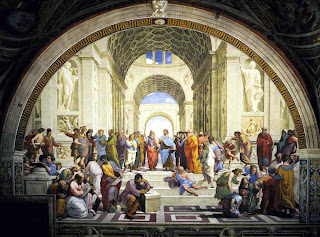Tackett then quotes from Webster’s 1828 American Dictionary of the English Language. “True religion,” Webster writes, “and true philosophy must ultimately arrive at the same principle.” I believe this is true. However, as I aim to show in later installments of this series, Tackett’s foundation is cracked and, ultimately, does not comport with reality as he demands it should do. My point in bringing this up is not to tear down the pillar of philosophy, but rather to highlight Tackett’s penchant for quoting from Webster as if it were Scripture, as if Webster’s definitions were eternally valid from time to time everlasting. (He did this a number of times in the first two lessons, and I suspect he’ll continue this practice in future lessons.) It’s as if Tackett doesn’t recognize that Webster’s dictionary was as much of a product of its time (i.e., early 19th-century America, which was heavily influenced by Christianity) as today’s more secular Webster’s 3rd New International Dictionary. It is Tackett’s tendency toward narrow-mindedness that blinds him to the environment from which his worldview sprung which constitutes one of TTP‘s greatest weaknesses. (I doubt highly that Tackett even recognizes from where his own particular brand of creationist philosophy is derived. See chapter 6 of Timothy P. Martin & Jeffrey L. Vaughn’s Beyond Creation Science.)
The truth is, the only true philosophy may very well not be Tackett’s. It reminds me of a parenting course that my wife and I began to take (and quickly abandoned) prior to having our first child. It is titled Growing Kids God’s Way. How arrogant. As if the Ezzos, who developed the approach, had finally discovered a one-size-fits-all method of parenting that God endorses, complete with allowing the Ezzos to add His name to their project. As much as I agree with Tackett regarding the importance of possessing a correct philosophy derived from a correct religion, and as much as my ethics may align with Tackett’s, I can’t agree that Tackett necessarily possesses the correct philosophy. The mere claim implicit in the title of Tackett’s DVD series smacks of pride. (God knows I’ve been guilty of the same many times in my life.)
As Tackett continues the lesson, he spends a considerable amount of time drawing attention to the philosophy of Carl Sagan, focusing on his famous declaration that “the Cosmos is all there is, all there was, and all there ever will be.” He also highlights Sagan’s equally famous quip that we humans are made of “star-stuff,” which is why our species feels so drawn to discover what I call our “solar heritage.” “Our contemplations of the Cosmos stir us,” Sagan said, toward obtaining a greater understanding of our place in this universe, pushing us to recognize and meditate on our connectedness to everything else around us. “Some part of our being,” Sagan continues, “knows this is where we came from. We long to return and we can because the Cosmos is also within us.” While neither Tackett nor I believe that Sagan’s “cosmos” tagline, nor his implicit pantheism, is correct, Tackett ridicules Sagan’s “star-stuff” comment, following it up with the anti-evolution epithet “goo-man,” referencing evolutionary biology’s assertion that human beings, along with the rest of the living world, have their origin in lower, less complex lifeforms. Science aside, I don’t think “dirt-man” has a flagellum to stand on. Ever read Genesis 2:7, Mr. Tackett?
Tackett then goes on to list a bunch of –isms that he believes constitute “hollow and deceptive philosophies,” such as materialism, idealism, empiricism, rationalism, naturalism, determinism, relativism, mentalism, mechanism, solipsism, subjectivism, institutionism, and hedonism. Again, I agree that all of these –isms are hollow and deceptive, especially if not complemented by theism. (No disrespect intended to my atheist or agnostic friends!) One of the –isms that Tackett contends against relentlessly in TTP is atheistic humanism, represented by science historian William B. Provine, the living, breathing “straw man” that Intelligent Design founder Philip E. Johnson had been waiting for his entire life. After playing a clip from a debate between Provine and Johnson, Tackett pounced upon Provine’s personal declaration of Darwinism’s implications, to wit, that “there are no gods or purposes, no ultimate foundation for ethics, no free will, no life after death, and no ultimate meaning in life.” Provine is dreadfully wrong, for Darwinism implies none of those things. Rather, Provine’s philosophical end game is a direct result of adopting an atheistic and philosophically materialist worldview, and not a result of accepting evolution as fact. Unfortunately, Tackett knows nothing about evolutionary biology and proceeds to take Provine at his word, holding him up as a paragon of non-virtue, and attacks the very science that I and many other Christians believe represents accurately the truth about the mechanisms by which life’s diversity arose.
I must also take exception to Tackett’s presupposition that God has revealed Himself in only two ways. The first method is through nature, or “general revelation.” Score one for Tackett, for I, too, believe that God’s nature is reflected by the orderliness and beauty of the cosmos, inasmuch as we understand it accurately (i.e., correct science). The second method, Tackett declares, is through the written Word, the Bible. While I believe that the Bible is, in a sense, revelation from God, I don’t necessarily believe that it can provide us with a correct “worldview” when taken as a whole, especially considering that there exists, within its very pages, inaccurate scientific concepts. If Tackett were truly bent upon adopting a worldview exclusively from the Bible, he’d join the ranks of the Flat Earth Society. Not to the exclusion of the written Word, I much prefer to recognize Jesus Christ as a superior method by which God revealed/reveals Himself, Jesus being the God-man about whom the Bible testifies. Only insofar as the testimonies of the New Testament writers reflect the true person of the Christ—and I believe those testimonies to be reliable and trustworthy—can we begin truly to develop a biblical correct “worldview,” one based upon the Living Word whose theology derived directly from the Father.
Lastly, I want to draw attention to something of which Tackett warns his audience: assumptive language. According to Tackett, assumptive language is a “powerful and deceptive use of words in which a seemingly simple statement is made, hoping the hearer will buy the simple statement without recognizing the huge assumptions that come with it.” If I may be so bold, Mr. Tackett, you are not innocent of manipulating assumptive language, and your audience is clearly not immune to falling prey to it. Being a dyed-in-the-wool Evangelical doesn’t mean your “goo” don’t stink. Can I get an “Amen”?



